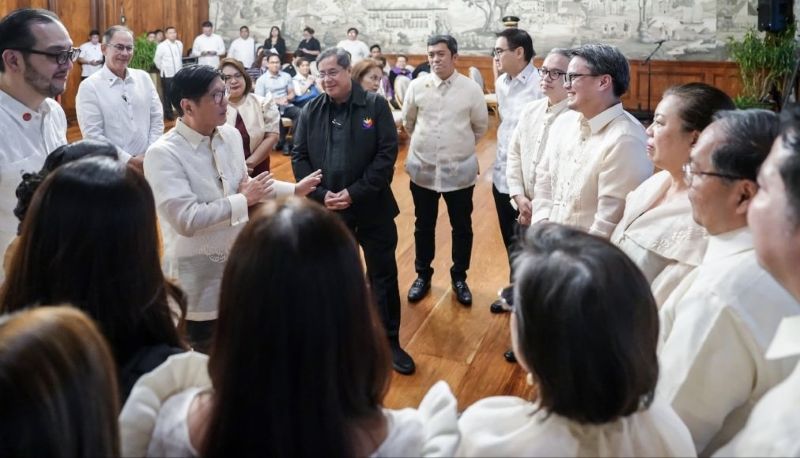The Private Sector Advisory Council - Healthcare Sector (PSAC-Health), in partnership with the Food and Drug Administration (FDA) and the Professional Regulation Commission (PRC), launched the Regulatory Sandbox Pilot Program on Flexible Supervision of Pharmacies, which aims to improve access to quality medicines in the underserved areas of the country.
This initiative underscores the private sector’s commitment to supporting the government's efforts in accelerating innovation and improvements in healthcare.
President Ferdinand Marcos Jr. witnessed the signing of the Memorandum of Understanding (MOU) at Malacañang Palace, reaffirming government support for evidence-based, innovation-driven reforms that strengthen healthcare delivery.
The program introduces innovative and flexible models of pharmacist supervision, including telepharmacy and remote oversight mechanisms, to help address the country’s long-standing shortage of practicing community pharmacists. It will be implemented in selected underserved areas in Luzon, Visayas, and Mindanao under the joint stewardship of the FDA and the Professional Regulatory Board of Pharmacy (PRB-PHA), with the participation of leading private pharmacies.
“By enabling pharmacies to operate with alternative supervision mechanisms, we can expand access to medicines, improve operational efficiency, and support the evolving role of pharmacy professionals in our healthcare ecosystem,” said Paolo Borromeo, PSAC Healthcare Sector Lead.
Based on data from the PRC, the Philippines currently has around 64,000 pharmacists with a valid professional identification card. However, the country faces a significant shortage of community pharmacists, as there are an estimated 30,000 active practitioners nationwide compared to the projected demand of 57,500. The one-to-one pharmacist-to-pharmacy licensing requirement under Republic Act 10918 (Pharmacy Law) has further limited the ability to open new pharmacies, particularly in remote areas.
To address these constraints, the Regulatory Sandbox Pilot will enable a single licensed pharmacist to oversee multiple pharmacies within defined geographic limits, using secure, FDA-approved telepharmacy platforms for remote supervision and consultations. It will also expand and closely supervise the role of pharmacy assistants to support licensed pharmacists in delivering essential medicines and services.
The program will utilize a data-driven and evidence-based approach to policy-making throughout the two-year pilot period, which will run from October 2025 to October 2027. The FDA, PRB–PHA, and PSAC-Health will collect data and conduct independent evaluations and semi-annual reviews to measure outcomes, safety, and effectiveness. The findings will guide future policy reforms under RA 10918 (Pharmacy Law).
Capacity-building will also be a major component of the initiative, with training and compliance support provided to participating pharmacies and personnel. The FDA and PRB–PHA will provide regulatory oversight and technical guidance, while participating pharmacies will shoulder usual operational, compliance, and training-related costs.
Beyond the pilot program, PSAC’s Health Sector Group continues to collaborate with government partners to strengthen healthcare delivery, accelerate the implementation of Universal Health Care, and foster innovation through public-private partnerships.
About Private Sector Advisory Council
The Private Sector Advisory Council (PSAC) was established by President Ferdinand “Bongbong” Marcos Jr. to foster stronger collaboration between the public and private sectors. Comprised of business leaders and experts across six key areas—Agriculture, Infrastructure, Digital Infrastructure, Education & Jobs, Healthcare, and Tourism—PSAC plays a vital role in driving economic growth. The council’s private sector executives are strategically convened by Sabin M. Aboitiz, President and CEO of the Aboitiz Group, ensuring strong leadership and effective engagement.
PSAC supports the government’s commitment to transforming the Philippine economy by advancing infrastructure development, creating jobs, attracting investments, promoting digitalization, enhancing agricultural productivity, supporting MSMEs, and boosting tourism. It also champions education reforms and upskilling initiatives to equip Filipinos with the knowledge and skills needed for a globally competitive workforce. Through these efforts, PSAC aims to build a more equitable, sustainable, and inclusive business environment.
The Council continuously provides policy recommendations to the government, regularly reporting to the President to offer insights, track progress, and refine strategies based on real-time developments.





